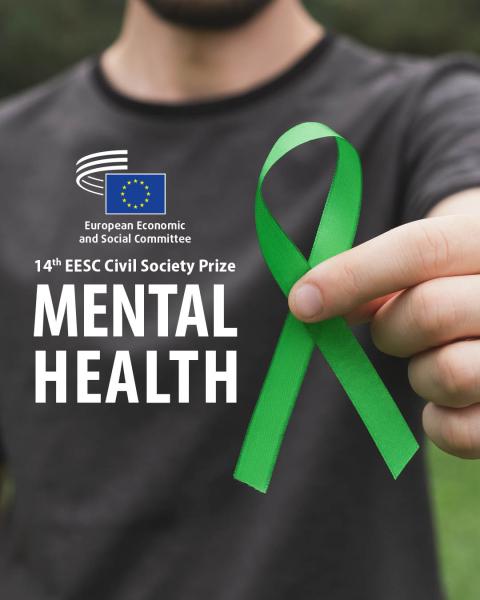European Economic
and Social Committee
EESC Civil Society Prize award ceremony: Creative projects from Finland, Ireland, Italy and Slovakia contend for first prize
On 7 March, the European Economic and Social Committee (EESC) will award its 14th Civil Society Prize, dedicated to mental health, to five non-profit projects: two from Finland and one each from Italy, Ireland and Slovakia.
The five nominees were selected from over 100 applications from 23 Member States, testifying to the dedication and motivation of Europe’s civil society to help people with mental health issues amid the staggering rise of this silent epidemic in the EU.
The ranking of the five winners will be announced at the Civil Society Prize award ceremony to be held in Atrium 6 of the EESC JDE building in Brussels at 11.45 a.m. on 7 March. The ceremony is part of the EESC’s inaugural Civil Society Week, which features the EESC’s top events promoting civil society participation in Europe’s political and democratic life.
The award ceremony will be followed by a press point with the prize winners, taking place at 12.30 in Atrium 6.
The five organisations will share a prize of EUR 50 000, with first place winning EUR 14 000. The awards will be presented by the EESC President Oliver Röpke and the EESC Vice-President for Communication Laurențiu Plosceanu.
The five winning projects (listed below in alphabetical order) are:
- AgeWell, a project by the Third Age Foundation, IRELAND
‘AgeWell’ is a social engagement network that improves well-being among older people who are isolated, frail and vulnerable. Using a combination of in-house visits and a smartphone application, it offers companionship and emotional support to those who lack them and identifies health risks at an early stage. Monitoring the elderly in need are older volunteers, who in this way enrich their own lives as well as those of others. AgeWell is run by the Third Age Foundation, a charity based in Ireland.
- The ‘Crazy? So what!’ initiative run by Integra, SLOVAKIA
The initiative ‘Crazy? So what!’ by Slovak organisation Integra breaks down stereotypes by promoting a compassionate understanding of mental health among young people and by providing first-hand insight into what it is like to have poor mental health and into the road to recovery. A professional expert and an adult with personal experience of mental illness visit schools for a day to talk to students aged between 15 and 20. The programme has been positively received by students, encouraging them to talk openly about their mental health and offering hope for the future.
- Lapinlahden Lähde — a community centre run by the Pro Lapinlahti association, FINLAND
‘Lapinlahden Lähde’, or ‘The Spring of Lapinlahti’ is a community centre which offers everyone, and especially people with mental health difficulties, a nurturing and inclusive environment to heal and enjoy nature and culture. Declared a diagnosis-free zone, it allows everyone to be who they are without being labelled, offering empowerment instead of paternalism. Built through the renovation of Helsinki’s Lapinlahti Hospital, and run by the non-profit Pro Lapinlahti association, the centre organises various workshops and events related to mental health literacy. It boasts 50 000 visitors each year.
- Telling Stories for Good — a project by the Animenta organisation, ITALY
With the project ‘Telling Stories for Good’, Italian non-profit organisation Animenta is rewriting stereotypical narratives on eating disorders, which affect more than four million people in Italy alone, two million of whom are adolescents. Its prevention and awareness-raising programmes are carried out by volunteer professionals online and in schools across Italy and have so far reached 10 000 children. It also provides specific help to those suffering from eating disorders and their families. Virtual online dinners, created with the help of a volunteer dietitian, also encourage young people to approach meals in a healthy way again.
- The World of Recovery — games created by the Lilinkoti Foundation, FINLAND
‘The World of Recovery’ consists of two games designed to support mental health. Set in a futuristic world of hope, they promote a player’s journey to recovery through goals that inspire a healthy self-image, personal autonomy, and an active and meaningful life. The first is a non-violent mobile game and the second is an award-winning table-top role-playing game. Created by the Lilinkoti Foundation, the games target mental health and substance abuse recoverers, along with professionals, and are free to use.
Further details about the Civil Society Prize are available on our web page.
The press release about the nominees is available here.
